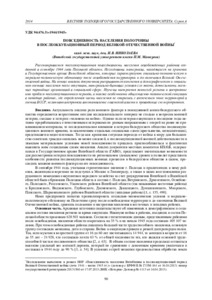Please use this identifier to cite or link to this item:
https://elib.psu.by/handle/123456789/8294Full metadata record
| DC Field | Value | Language |
|---|---|---|
| dc.contributor.author | Николаева, И. В. | - |
| dc.date.accessioned | 2015-01-16T12:50:02Z | - |
| dc.date.available | 2015-01-16T12:50:02Z | - |
| dc.date.issued | 2014 | - |
| dc.identifier.citation | Вестник Полоцкого государственного университета. Серия A, Гуманитарные науки : научно-теоретический журнал. - 2014. - № 9. – C. 90-94. | ru_RU |
| dc.identifier.issn | 2070-1608 | - |
| dc.identifier.uri | https://elib.psu.by/handle/123456789/8294 | - |
| dc.description | I. Nikolayeva. Everyday Life of the Polotsk Region Population During After the Occupation Period of the Great Patriotic War | ru_RU |
| dc.description.abstract | Рассматривается послеоккупационная повседневность населения освобожденных районов созданной в сентябре 1944 года Полоцкой области. Исследованы материалы, находящиеся на хранении в Государственном архиве Витебской области, которые характеризуют социально-экономическую и морально-политическую обстановку после освобождения территории и до окончания Великой Отечественной войны. На основе анализа документов раскрываются изменения в демографическом и социальном составе населения после оккупации, материально-бытовые условия его жизни, деятельность местных партийных организаций в социальной сфере. Изучены настроения жителей региона и восприятие ими проблем послеоккупационного периода, а также особенности общественно-политической ситуации в западных районах, где определенная часть населения не смирилась с включением этих территорий в состав БССР, негативно восприняла восстановление советской власти и проводимые ею мероприятия. = The article deals with study of the everyday life of the population in the liberated areas established in September 1944 the Polotsk region. There are archival materials which characterize such problems as the so-cial-economic and moral-political situation after release of the territory and before the end of the Great Patri-otic war. On the basis of documents the changes in demographic and social structure of the population after the occupation, physical living conditions of its life, the activity of local party organisations in the social sphere are revealed. The mood of the people of the region and the perception of their problems period, and especially the political situation in the western regions, where a certain part of the population did not accept the inclusion of these territories in the BSSR, reacted negatively to the restoration of soviet power and its ongoing activities are studied. | ru_RU |
| dc.language.iso | ru | ru_RU |
| dc.publisher | Полоцкий государственный университет | ru_RU |
| dc.relation.ispartof | Веснік Полацкага дзяржаўнага ўніверсітэта. Серыя А, Гуманітарныя навук | be_BE |
| dc.relation.ispartof | Herald of Polotsk State University Series A, Humanity sciences | en_EN |
| dc.relation.ispartof | Вестник Полоцкого государственного университета. Серия A, Гуманитарные науки | ru_RU |
| dc.relation.ispartofseries | Серия A, Гуманитарные науки;2014. - № 9 | - |
| dc.rights | open access | ru_RU |
| dc.subject | Государственный рубрикатор НТИ - ВИНИТИ::ОБЩЕСТВЕННЫЕ НАУКИ::История. исторические науки | ru_RU |
| dc.subject | БССР | ru_RU |
| dc.subject | Вторая Мировая война | ru_RU |
| dc.subject | послеоккупационный период | ru_RU |
| dc.subject | Витебская область | ru_RU |
| dc.subject | Полоцкая область (1944 г.) | ru_RU |
| dc.subject | социально-экономическое положение | ru_RU |
| dc.subject | партийные организации | ru_RU |
| dc.title | Повседневность населения Полотчины в послеоккупационный период Великой Отечественной войны | ru_RU |
| dc.type | Article | ru_RU |
| Appears in Collections: | 2014, № 9 | |
Items in DSpace are protected by copyright, with all rights reserved, unless otherwise indicated.
